#International Air & Sea Transporters
Explore tagged Tumblr posts
Text
Connecting Continents: Bridging Distances with Air and Sea Freight International Cargo Service
As businesses expand globally, the need for reliable transportation solutions becomes paramount. Our air and sea freight services act as the lifeline connecting continents, facilitating the seamless movement of goods across vast distances. Whether it's traversing the skies or sailing the seas, we bridge the gap between markets, empowering businesses to thrive in an interconnected world. With our commitment to excellence and innovation, we ensure your cargo reaches its destination swiftly and securely, opening doors to new opportunities on a global scale.
0 notes
Text
#Sea Freight Forwarder in India#International Air Cargo Services from India#Multimodal Transport Operator Service#Domestic Goods Transport Cargo Services
0 notes
Text
I figured I should list setbacks and consequences (including signs of internal collapse) faced by Israel in the past couple of months. I'll make this as chronological as possible. Add any you think I missed.

While Hezbollah targets Haifa, Golan Heights, and new settlements


Gaza continues to punish the invading army










More and more western publications are forced to admit that Israel cannot defeat the Palestinian resistance









“This is a very high number that encompasses many sectors. About 77 percent of the businesses that have been closed since the beginning of the war, which make up about 35,000 businesses, are small businesses with up to five employees, and are the most vulnerable in the economy,” Yoel Amir, CEO of Israeli information services and credit risk management firm, CofaceBdi, told Maariv. The report adds that “the most vulnerable industries are the construction industry, and as a result also the entire ecosystem that operates around it: ceramics, air conditioning, aluminum, building materials, and more – All of these were significantly damaged,” according to CofaceBdi’s risk ratings. The trade sector has also been severely affected. This includes the service sector and industries including fashion, furniture, housewares, entertainment, transport, and tourism. Israel is in a situation where “there is almost no foreign tourism,” the report said, adding that “damage to businesses is all over the country, and almost no sector has been spared.” This includes the agriculture sector, which is based mainly in the south and the north – both considered active combat zones due to the threat posed by the Palestinian resistance and Lebanon’s Hezbollah – whose support front against Israel has significantly contributed to the downfall of the economy. The CofaceBdi CEO estimates that 60,000 Israeli businesses are expected to be shut down by the end of 2024.


ICYMI, Yemen's armed forces have said they got a direct hit on Eisenhower, a nuclear powered aircraft carrier, forcing it to leave the Red Sea






Israel's attack on Yemen is playing a role in bringing Yemen's civil war to an end.
Etc, etc.
The point of this post is to encourage everyone who reads it. Keep talking about Gaza, keep boycotting, keep protesting, keep resisting.
#yemen#jerusalem#tel aviv#current events#palestine#free palestine#gaza#free gaza#news on gaza#palestine news#news update#war news#war on gaza#axis of resistance#palestinian resistance#boycott divest sanction#bds movement#anti zionism#ansarallah#hezbollah#long post#ansar allah#red sea blockade#red sea
3K notes
·
View notes
Text
Out of Gauge (OOG) Shipments
Out-of-gauge (OOG) shipments represent a distinctive category within the realm of cargo transportation. This classification pertains to cargo that exceeds the typical dimensions of standard shipping containers. In essence, "Out of Gauge" signifies that the cargo's size, shape, or weight requires specialized handling due to its non-conformity to conventional shipping containers. These shipments can encompass a diverse range of goods, from exceptionally long steel beams and oversized machinery to irregularly shaped industrial equipment. To cater to such non-standard cargo, special equipment, such as flat racks or open-top containers, is employed to accommodate OOG shipments. Successful planning and logistics for OOG cargo necessitate meticulous attention to detail, precise measurements, and secure lashing and fastening techniques to ensure the safe and efficient transport of these extraordinary loads, making them an intriguing and challenging facet of the shipping industry
#freight broker#freight forwarding#logistics#transportation#air freight#transportservice#supplychainmanagement#sea freight#supplychainsolutions#shipping#shippers gonna ship#global shipping#shipper#international shipping
0 notes
Text

International Shipping with Reliable Freight Forwarding Services in Africa
If you are looking for reliable international transport services in Africa, consider partnering with experienced freight forwarding companies. freight forwarders have a long list of connections in the industry, which allows them to provide low rates and quick transit times African Intercontinental is an experienced international air and ocean freight forwarder that connects you with all major global markets Freight forwarders can help carry out logistic operations and make transporting goods from one place to another much more.
#International transport services In Africa#Freight forwarding services In Africa#Intercontinental forwarding service#Air freight transportation service#Sea freight transportation service
1 note
·
View note
Text

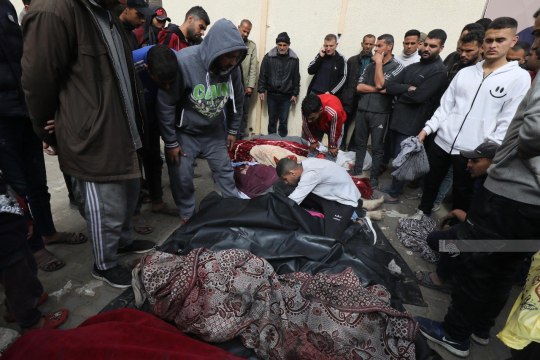
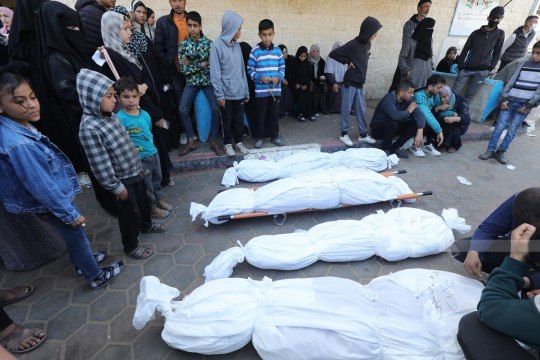


[ 📸 📹 Footage shows scenes of massive destruction everywhere to be seen after the withdrawal of Zionist forces in Hamad Town, a city in the Khan Yunis governate, in the southern Gaza Strip, while photos show the bodies of the dead resulting from IOF airstrikes targeting civilian homes in Deir al-Balah overnight, in the central Gaza Strip.]
🇮🇱⚔️🇵🇸 🚀🏘️💥🚑 🚨
HAMAD TOWN IN KHAN YUNIS COMPLETELY FLATTENED BY ZIONIST FORCES, DOZENS KILLED ON DAY 159 OF ISRAEL'S GENOCIDE
On the 159th day of Israel's ongoing war of genocide in the Gaza Strip, and on the second day of Ramadan, the Israeli occupation forces (IOF) committed a total of 10 massacres of Palestinian families, resulting in the deaths of no less than 88 Palestinian civilians, mostly women and children, and wounded another 135 others over the previous 24-hours.
In a highly illegal attack on the sovereign state of Lebanon, a Zionist raid targeting a civilian vehicle near the Al-Hosh Junction in the city of Tyre killed the Hamas political leader Hadi Mustafa, from the Rashidiya Camp, and wounded three other Lebanese civilians.
According to Lebanese media, Zionist artillery also fired on the Marjayoun Plain while Israeli military and reconnaissance aircraft operated in Lebanese airspace, with the local government calling on the International community to put a stop to Israeli strikes within its borders.
In the north of the Gaza Strip, Zionist artillery forces fired four shells towards the vicinity of Al-Quds Hospital, affiliated with the Palestinian Red Crescent Society (PRCS), in the Tal al-Hawa neighborhood of Gaza City, killing at least five civilians, including children, and wounding several others.
Similarly, Israeli warplanes targeted with airstrikes the civilian neighborhoods of Al-Daraj and Al-Zaytoun in Gaza City, resulting in the deaths of 15 Palestinians, including two women and at least seven children, while wounding dozens of others.
According to reports on the bombings, occupation warplanes bombarded a civilian home in the Al-Daraj neighborhood which killed seven civilians, including three children and wounded several others.
Later, a second strike targeting the Azzam family home in the Al-Zaytoun neighborhood, southeast of Gaza City, killed no less than eight civilians, including four children and two women, with a number of others wounded as well.
Israeli occupation aircraft also bombarded the Lulu family home in the Al-Daraj neighborhood of Gaza City, killing two Palestinian civilians and wounding four children as a result.
IOF airstrikes and artillery fire also concentrated on the central Gaza Strip, with occupation forces targeting four civilian homes in the city of Deir al-Balah overnight.
In the first attack, Zionist air forces bombarded the Al-Atrash family home in Deir al-Balah, killing at least 11 civilians, most of whom were women and children, and wounding dozens of others.
Subsequently, IOF fighter jets bombed the Al-Qudra family home, resulting in the tragic deaths of 11 additional Palestinians, while a strike targeting the Abu Sanjar family home killed at least 7 civilians.
In another strike, occupation forces targeted the Al-Yazuri family home, also in Deir al-Balah, leading to 25 civilians killed or missing under the rubble of their home.
In another Zionist atrocity, the Palestinian fisherman's syndicate announced the horrific murder of two of its members, Muhammad and Youssef Adel al-Sayyid Abu Riyala, after being targeted by occupation gunboats while fishing off the coast of Al-Nuseirat in the central Gaza Strip, known locally as the Nuseirat Sea.
Moving towards the Southern Gaza Strip, IOF artillery shelling concentrated near Hamad Town, in the Khan Yunis governate, where violent clashes with Resistance forces led several Israeli aircraft to land in the area to transport wounded Zionist soldiers for medical care.
Local Paramedic personnel also transported the body of martyr Haitham Muhammad Deeb Suwaidan (35yo) from Khan Yunis to Al-Najjar Hospital in the city of Rafah.
Additionally, IOF soldiers detonated several residential homes east of Khan Yunis, in the southern Gaza Strip.
As a result of Israel's ongoing war of genocide in the Gaza Strip, the infinitely rising death toll stemming from Israeli attacks now exceeds 31'272 civilians killed, more than 25'000 of which being women and children according to the United States Pentagon, and wounding another 73'024 others since the current round of Israeli aggression began on October 7th, 2023.
#source1
#source2
#source3
#source4
#source5
#source6
#source7
#photosource
#videosource
@WorkerSolidarityNews
#gaza#gaza strip#gaza news#gaza war#gaza genocide#genocide#genocide in gaza#genocide of palestinians#palestine#palestine news#war on gaza#palestinians#israeli genocide#israeli war crimes#war crimes#crimes against humanity#israel#israeli occupation#israeli occupation forces#israel palestine conflict#middle east#war#politics#news#geopolitics#world news#global news#international news#breaking news#current events
1K notes
·
View notes
Text
Fun Fact: Starfish get around using a hydraulic system!
I want to start off by saying: you may have heard that starfish have sea water instead of blood! This is not true!
Before I explain, let me point out this little dot that every starfish has (and I SWEAR that this is relevant)

(It’s like they all have lil’ buttons on! 1, 2, 3)
This little spot is known as a madreporite, from Italian madre (”mother”) + Latin poro (”pore”).
What is it? Well, to over-simplify:
The madreporite is basically a pressure valve for the insides of the starfish. It lets water in and out of its water vascular system as needed. In order to prevent debris and sea life and other non-desirables from getting inside the starfish, the madreporite filters the water that it takes in.
this is what the madreporite looks like up close:

(Name origin: apparently someone saw that and thought “huh, that kind of looks like madrepore coral, but tiny! They... weren’t wrong.)
Now, you may look at the name “water vascular system” and think “hey, I know ‘vascular’! That's related to blood!” This is a reasonable misunderstanding.
While in humans, the circulatory system is part of a vascular system (along with our lymphatic system) in the starfish’s water vascular system, seawater is NOT analogous to blood in a circulatory system. Or, well, it’s complicated, because it does do some things that are similar to a mammalian circulatory system, such as transporting certain types of immune cells, but still (source: Ferguson 1966)
Instead, these seawater-filled tubes are used for things such as the movement of starfish arms (and their little tube feet), which in turn allows them to move around their environment, find and consume food, and stick to surfaces. Mammals generally don’t use their circulatory systems in this way (if I am wrong about this, PLEASE let me know, as that would be absolutely WILD).

(diagram of a starfish’s water-vascular system, revealing the starfish’s final form: some sort of fidget toy, I think)
I admit that “starfish use seawater instead of blood” is a much more attention-grabbing headline, but it’s not true, and it’s also kind of sad, because the water-vascular system is really cool without the misinformation!
(before you ask, yes, this entire post was prompted by one (1) person saying something that was WRONG, and that person may or may not have been related to me 😤😭😭😭😭😭)
The water-vascular system is, essentially, a hydraulic system. By adding and expelling water, as well as opening and closing internal channels via muscle contractions, starfish can create positive and negative pressure within their bodies. This allows them to “flex” their tube feet in surprisingly complex ways, among other functions.

(these^ are a starfish’s “tube feet”. They are little structures with suckers on the ends. If you’ve ever held a starfish in your hands, you probably felt these feet holding onto you. They have a surprising amount of strength!)
You can imagine this sort of like how a whacky inflatable tube man uses air pressure to straighten up and fall down, except with hundreds in one connected, complex system (and also the pressure is more tightly controlled in order to prevent all that flailing, and also to allow fine control required for things like ripping open a mollusc shell).

(I always imagine this when looking at starfish tube feet. And now, maybe you will too! join me. 1, 2)
The confusion regarding starfish blood being seawater is understandable, but in the end it’s essentially a misunderstanding.
Plus, starfish have coelomic fluid, which is honestly more analogous to blood.
Coelomic fluid is, basically, the fluid that fills the starfish’s body cavity between all of its organs and such, facilitating nutrient transport, gas exchange, and overall being more blood-like than the water-vascular system in general (Andradre et al. 2021).
And ok, technically the liquid part of coelomic fluid comes from seawater, ultimately, but that would be like saying I, a human, use tap water for blood. And, ok, yes, there is water in my blood, and that water came from the tap, but no one would say that I have tap water instead of blood! Except my brother but he also says trigonometry doesn’t exist so we will be ignoring his opinion at this time.
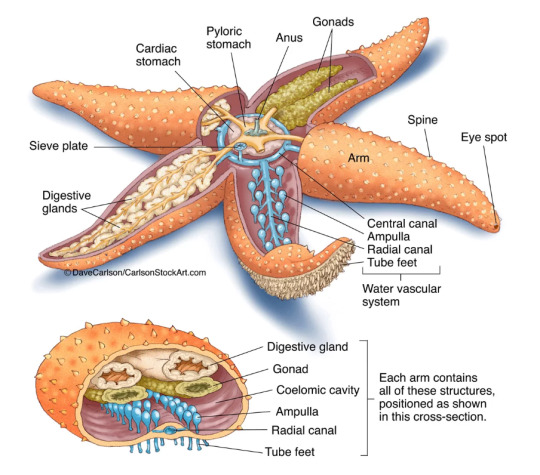
(a more detailed diagram than the one before. The coelomic fluid is found in the coelomic cavity! Also, as a bonus, you now know where a starfish’s anus is! Enjoy this new knowledge next time you look at a starfish! source: x)
Starfish aren’t the only animals with a water vascular system and a madreporite. They can also be spotted in other echinoderms, such as sea urchins, sand dollars, and sea cucumbers (although in the sea cucumber the madreporite is inside the animal, so you probably won’t see it in the wild).
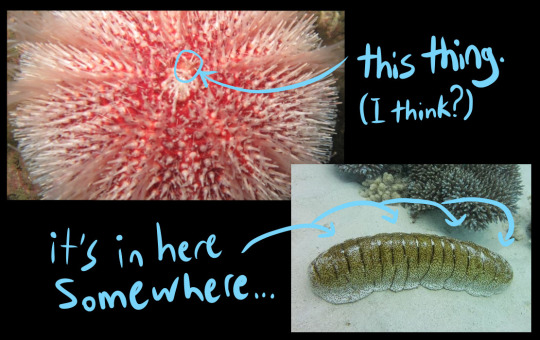
That said, starfish have my favourite madraporites, because I think they look like little badges. They all win the award of being lil friends (and also keystone species that are essential to many marine ecosystems. So.)
This has been Fun Fact Friday, telling you all about wacky lil friends who have funny little feet and DO NOT HAVE SEAWATER INSTEAD OF BLOOD!
I will do battle with my sibling later, as is tradition
Sources under Read More:
Andrade, C., Oliveira, B., Guatelli, S., Martinez, P., Simões, B., Bispo, C., ... & Coelho, A. V. (2021). Characterization of coelomic fluid cell types in the starfish Marthasterias glacialis using a flow cytometry/imaging combined approach. Frontiers in Immunology, 807.
Ferguson, J. C. (1966). Cell production in the Tiedemann bodies and haemal organs of the starfish, Asterias forbesi. Transactions of the American Microscopical Society, 200-209.
Mao, S., Dong, E., Zhang, S., Xu, M., & Yang, J. (2013, July). A new soft bionic starfish robot with multi-gaits. In 2013 IEEE/ASME International Conference on Advanced Intelligent Mechatronics (pp. 1312-1317). IEEE.
#biology#science#stem#fun fact friday#science side of tumblr#animals#starfish#marine biology#there are many benefits to being a marine biologist#such as knowing the location of a starfish's butthole
1K notes
·
View notes
Text
When Duty Calls Part 1 | Cyclone x Reader
Word count: 1.9k
Summary: Your return home brings you inner turmoil, prolonged typing bubbles, and what may turn out to be a chance to mend what you broke.
Warnings: mentions of anxiety, a lot of internal thoughts/monologue, implied non-platonic feelings (if you squint).
a/n: This took a bit longer to get out than I’d hoped, but I’m so excited to have gotten the ball rolling!
Read on AO3

In your experience, one of the hardest parts of being back stateside is the noise. Both the quiet and the loud.
Your former home — An aircraft carrier somewhere in the middle of the Pacific — was by no means quiet, but each sound, each movement, each person, had its purpose. the low hum of radio chatter or the sound of planes taking off overhead had become a strange comfort to you. You were one of the lucky ones who quickly found where you belonged amongst that noise. Now after years spent painstakingly carving your name into the Naval history books, you were far from just another officer. And yet, in some twisted way, that glorious reputation of yours is exactly what brought you back here in the first place.
Exactly 23 hours ago you were still stationed on that aforementioned aircraft carrier, completely unaware that you would soon be summoned and informed — albeit with more eloquent verbiage — that you were to pack your things and head back to TOPGUN. A thousand different questions brewed inside you, but you were well aware that the Navy has never been the place to voice them. Instead, you honored each following set of instructions with nothing more than a simple "Yes sir, no ma'am".
The subsequent hours were filled with personal chaos and three different modes of transportation. Luckily, not much could phase you at this point. At least not enough for anyone to pick up on your external cues of panic. Contrary to the aviator stereotype, you liked to think of yourself as level-headed with a strong preference for flying under the radar, both in a literal and figurative sense. You'd weathered through everything the last 24 hours had thrown at you without so much as a snide remark. You kept your calm when the airline briefly lost your single piece of checked luggage. You even brushed off each lingering stare and every all too frequent ask of "So, Is your husband/brother/father/next-door neighbor in the service?". Yet, approximately three and a half minutes ago, something in you started to crack. Logic told you that this was just your nervous system coming to terms with what the next several weeks would entail, but an increasingly large part of your mind knew that that was only half the story. But seeing as you currently found yourself frozen in the back of your Uber, gripping the door handle as if your life depended on it, these facts were neither here nor there. As the latest wave of anxiety runs its course you suppress a shudder and call on your now-sapped willpower. Logic once again tells you that fresh air helps in these situations, so you force your pointer finger out and roll the window down. You hold the button until the window is right above halfway down. Just far enough to let the bright San Diego sunshine in while still allowing you to lean your head against the cool glass. After a few deep breaths, you run your tongue along the outside of your lips. The air is laced with the familiar taste of sea salt. If your memory served you right, you were just under a mile from the ocean and no more than three from base. The thought had barely crossed your mind before the pang of countless different emotions hit you. You silently curse your faultless sense of direction. In sudden need of a distraction, your free hand reaches into your bag and pulls out your phone. You blink away the dryness in your eyes before shifting your attention to the small screen which only takes a halfhearted tap to flash to life. You swipe through your notifications before tapping on the message that's been lingering in the back of your mind since the early hours of the morning.
I'm assuming you've been made aware of your latest assignment. received 7:13 am. — followed by — We hope your trip back goes well. received 7:26 am.
I landed about an hour ago, you text back. Headed home now.
It didn't surprise you that Warlock would be the first to reach out. Given his rank and location, he probably knew all about the mission. Plus, if you knew anything about the man, it was that he's always been the diplomatic type. From the stories you heard of their younger years, a part of you has always wondered if this is why his friendship with Cyclone worked so well.
Speaking of Cyclone, you click the back button and select his contact. Your last conversation with him — dated just one day before your deployment — quickly appears. God, had it really been almost five months since you last spoke? At this revelation, you sit staring at the screen for a few beats. You knew him and his personality far too well to expect him to welcome you back with open arms, but that didn't make the radio silence hurt any less. You want nothing more than to reach out, but with a shaky breath, you remind yourself that he's a horribly busy man with fewer personal relationships than you can count on one hand. However, this doesn't stop a flash of sadness from coursing through your body.
Exiting the text thread, you click on the only other new message. It's from an unsaved number and its contents inform you that everyone who's been called back is meeting up tonight at the Hard Deck. Just as you are about to send back a quick "thank you. Who is this?", something else pops into your mind and grabs your interest entirely. You quickly back out and tap on Warlock's contact. You read his second message again, Then at least five more times after that.
We hope your trip back goes well.
We?
You weren't one to get into the semantics of things, but the ambiguity of his word choice hung heavy over you. There was a possibility that he was innocently referring to himself and his wife. Yet there was an equal, and far more electrifying, chance that he was talking about himself and Cyclone. It was no secret to Warlock that the pair of you were, at least at one time, immensely close. That familiar itch returned to your fingertips, though this time you feared it would be here to stay. Over the last five months, You've been down this path countless times before. Yet each time it got harder and harder not to simply dial his number and ask about his day as if no time had passed at all. Reminding yourself that the chances of him picking up were firmly in the negative, you looked from your phone entirely and instead redirected your sights to the world outside. As you look up, The car rounds one last corner and the familiarity of your surroundings kicks into overdrive. The lump in your throat grows as both the ocean and your house come into view. Your heart swells as you realize your neighborhood hasn't changed a bit. You were fully prepared for your homecoming to be emotionally taxing, but what you hadn't prepared for was just how right it would all feel.
You come to a stop at the curb directly across from your house. You thank the driver as you exit, and a moment later your feet hit the concrete. Your hands are surprisingly steady against your luggage. The car slowly pulls away. You are left standing in your yard, phone in hand, staring up at your long-established home. The walk up the driveway is one you've made at least a thousand times. And something in you knows that it's the bittersweet familiarity of it all that finally allowed your one inescapable urge to take hold.
The rational side of your brain — the one you should be more inclined to listen to in this situation — told you that he's probably terribly busy doing all those terribly important Vice Admiral things he spent far too many hours a day doing. But the emotional side — the one that above all else, won't let you forget your history together — told you that all you really wanted was to hear his voice again. Or at very least get a few words of blunt (and often trenchant) encouragement. Your suitcase rolls over polished hardwood as you close the door behind you. The only thing you're greeted by is a stale silence. Your friends in the area had been kind enough to stop by while you were gone to ensure remained in working order, but that didn't make the stillness any easier to swallow.
Surely there's no harm in simply reaching out, right?
It was in that moment, standing with your back against the front door, that you hoisted up your white flag of defeat. Almost instantly your fingers were fast at work typing out your message before your conscience could reckon with how bad this idea was. Your words of choice were innocuous enough, yet you feel nothing but anguish the moment after you hit send.
Hey there. I know it's been… a while. You probably know I'm back in town on orders. If you have the time, I'd love to catch up. Sent >1min ago.
You kick your shoes off with a frustrated huff and immediately head for your bedroom. For what you lacked in the typical aviator ego, you made up for tenfold with split-second impulsiveness. On the bright side, you at least had the sense to leave the "I miss you so bad please respond" part unsaid. It's a short walk, and you toss your phone onto your bed once you're there with the full intention of taking a quick shower. Only, your phone lands face up. Leaving you watching in horror as your still unlocked screen proudly displays the typing bubbles on his end slowly appearing and disappearing.
Somewhere between bolting back out of the room and spending 45 minutes under the ice cold water coming out of your shower head, you pulled together a crude course of action. For the duration of your time here, you will do nothing but keep your head down, execute the mission, and be the Navy's perfect little flying angel. Somewhere between the lines of the damp post-it note you jotted this down on are the words "and no more attempts at reconnecting with the people you left in the past.". though even you know that even your best attempt at following that step will wind up unavailing at best. Post shower and with a slight semblance of a plan in place, you were already starting to feel like yourself again. Like every other mission, your ability to execute the plan would make or break you, and If the secrecy surrounding why exactly you were called back to Top Gun was anything to go off of you would have to be entirely focused and at your most cutthroat.
Exiting your room, you made your way to the front door where you quickly pulled on your boots and grabbed your keys from the dish in the entryway. The route from your house to the Hard Deck is one that's permanently etched into your mind. This wasn't the time nor the place to be making friends and in all honesty you wanted nothing more than to stay in and order takeout. However, you knew that you needed to scope out your competition as soon as possible.
You check the entryway mirror one last time before turning the knob and passing the threshold. You square your shoulders as you make the short walk to your car while also doing your best to ignore the growing feeling that the first of many wrenches is about to be thrown at your freshly made strategy.

Taglist: @luckyladycreator2, @katesmadness, @natasharomanoffisbaebby, @nobody7102, @idiomaticpunk, @thebeckyjolene, @paintballkid711, @simpledyiing, @barbiewritesstuff, @bbooks-and-teas, @starshipfantasy, @saramaple, @marchingicenotes7, @bayisdying, @princessofglitterland, @katesmadness, @shakira-sasha, @xoxabs88xox, @nyx2021, @qardasngan, @fanboyluvr, @mrsjaderogers, @bellamy1998, @alexxavicry, @madamemelancholysstuff, @autumnleaves1991-reads, @dozcan123, @nani-kenobi, @noxytopy, @accio-boys, @the-winter-marvel33, @justameresimp, @abaker74, @starlightmoon2020, @comfortzonequeen, @flrboyd, @heyitskay-21, @kmc1989, @kkrenae (let me know if you'd like to be added!)
#top gun maverick#top gun#top gun x reader#beau cyclone simpson#cyclone#top gun maverick x reader#top gun movie#top gun fanfiction#top gun fanfic#top gun fic#top gun headcanons#top gun maverick fanfiction#topgun#topgun maverick#beau cyclone simpson x reader#beau simpson#beau simpson x reader
178 notes
·
View notes
Text
The Ultimate Guide to Groupage Shipping in Dubai

Groupage shipping is a popular and cost-effective solution for businesses and individuals looking to transport smaller shipments efficiently. In a bustling hub like Dubai, groupage shipping has become an essential part of the logistics landscape, offering affordable and reliable options for both local and international cargo needs.
What Is Groupage Shipping?
Groupage shipping, also known as consolidation shipping, is the process of combining multiple smaller shipments from different customers into a single container. This method optimizes container space, significantly reducing shipping costs while ensuring secure and timely deliveries.
For businesses in Dubai, a city renowned for its global connectivity and trade, groupage shipping provides a flexible and budget-friendly solution for transporting goods across the UAE and internationally.

Why Choose Groupage Shipping in Dubai?
Dubai is a global logistics hub, and its strategic location makes it an ideal base for shipping to destinations worldwide. Here are the key benefits of groupage shipping in Dubai:
1. Cost-Effectiveness
By sharing container space, businesses can save on shipping costs compared to booking an entire container for smaller shipments.
2. Efficient Use of Resources
Groupage shipping maximizes container utilization, making it a sustainable choice for businesses focused on reducing waste and costs.
3. Seamless Customs Clearance
Experienced logistics companies in Dubai, like Marshall Logistics, handle all customs documentation and procedures, ensuring smooth clearance for your shipments.
4. Global Connectivity
With Dubai’s extensive sea, air, and road networks, groupage shipping services reach destinations across the GCC, Europe, USA, Asia, and beyond.
5. Tailored Solutions
Logistics providers offer personalized services, including door-to-door delivery, real-time tracking, and expert handling for delicate or high-value goods.

Popular Groupage Shipping Routes from Dubai
Marshall Logistics specializes in groupage shipping to a variety of destinations, including:
GCC Countries: Affordable road freight to Saudi Arabia, Oman, Kuwait, Bahrain, and Qatar.
Europe: Seamless sea freight services to the UK and other European countries.
Asia: Cost-effective shipping solutions to India, Pakistan, and other Asian markets.
USA & Canada: Reliable and secure sea freight services for businesses expanding across North America.
Australia & New Zealand: Safe and timely shipping for goods to Oceania.
How Marshall Logistics Simplifies Groupage Shipping in Dubai
As a trusted logistics provider in Dubai, Marshall Logistics offers end-to-end groupage shipping services tailored to your unique needs:
Customs Clearance: Handling all necessary paperwork to ensure compliance with destination regulations.
Real-Time Tracking: Providing updates on your shipment’s journey for complete transparency.
Secure Handling: Using high-quality packaging materials to protect your goods during transit.
Affordable Pricing: Competitive rates for businesses and individuals.
Get Started with Groupage Shipping in Dubai
Whether you’re a business looking to expand globally or an individual needing to transport goods, groupage shipping in Dubai is an excellent option to save money and streamline logistics.
Contact Marshall Logistics today to learn more about how our groupage shipping services can help you achieve your shipping goals. Let us handle the complexities so you can focus on growing your business!

#international movers#moving company#relocation#moversandpackers#air cargo services#air cargo shipping#road freight#freight forwarding#freight transportation#movers near me#air freight#freightforwarding#sea freight
0 notes
Text
Shipping from Uk to Tanzania

We ensure proper and consistent pick up from all 50 US states and Uk, for all manner of packages and deliver them to your door. You can also get prompt purchase assistance from us and shipping at the same time. Shipping from UK to Tanzania and shipping from Uk to Ghana is quite prominent with AQUANTUO.
With AQUANTUO, you pay only a fraction of what you would pay to the competition. Especially in comparison to what you generally pay for freight services to companies like FedEx, DHL, USPS/Tanzania Post/Posta Tanzania, and UPS, etc. If you are shipping from Uk to Tanzania or shipping from Tanzania to UK, we are here to help.
We confirm each package received or picked up, verify that they are in a good state, and repackage where necessary before shipping. We also keep you informed every step of the way via timely notifications and through our tracking system. The clearance from customs for all of your items is our responsibility. At Aquantuo, we make sure that you get the best shipping services at low prices.
#UK#Tanzania#shipping#freight#logistics#international shipping#cargo#transportation#end-to-end#reliable#secure#fast#personalized service#air freight#sea freight#land freight#freight solutions#shipping company#freight company#AQUANTUO
0 notes
Text
Fighting Exs pt 3
Sweet Pea X Reader
----------------------------------
“Reg stop! Where are you going?!” You half shouted across the car park to your ex boyfriend, his back to you looking to where he parked his car.
“I have to kick some Serpent ass” you finally caught up to him outside his car, snatching his keys from his hand.
“YN!”
“Reg stop, it was an accident, we were just dancing and he did it by mistake!”
“Dancing?! You were dancing with that jerk? Isn't it bad enough you took his side yesterday, now you're off dancing with him? What has gotten into you YN?” Your eyes landed on the ground at his sharp tone. You were transported back to when you were dating, being reprimanded for even the smallest thing.
“We were…we were having fun”
“YN, it's okay to have made a mistake” your face contorted in confusion as he moved towards you and caught hold of your hands, dragging your gaze back to him.
“YN, I'd take you back, we can be back together again” you scoffed loudly at him pulling back your arms from his grip.
“I have self respect Reggie”
“Really is that new? Come with the Serpent?” He bit, cocking his head to one side. Ever a group for good timing, Fangs and Sweet Pea rode up the driveway of Pops on their motorbikes. Fangs on the way to meet Kevin, accompanied by Sweet Pea who hoped to run into you. The two parked their bikes, removing their helmets releasing laughter from beneath, short lived as Sweet Pea found his eyes on you and Reggie.
“C'mon YN, come back to me, you'll never find better” his words fed an internal voice you regularly fought off. You bit your lip looking back down, he slowly caught hold of your arms again, unaware of the Serpent heading in your direction.
“No” you almost whispered, pulling back again.
“Don't say no to me! No one else will want you!” The words you hadn't heard from him in so long brought crashing memories back of a tumultuous relationship, you felt your mind go out to the sea of sadness it had spent so long trying to escape from when a familiar voice came as a life raft.
“I’d want her…if she'll have me” you both spun to face Sweet Pea, still holding his helmet in one hand, his other in his leather jacket pocket.
“You!” Reggie seethed, springing from his spot, almost knocking you to the floor in the movement. Your friends came out from inside Pops, to find the Serpent and the Bulldog rolling around shouting and fighting. Kevin ran to your side as you screamed at them both to stop.
“You fucking loser!” Reggie screamed as Archie hauled him up off the floor after Jughead pulled Sweet Pea off of him.
“I'm not the one who cheated on the perfect girl!” He spat back. Your friends' heads shot in your direction. The secret was out. The secret you kept to keep things normal. The secret you kept so they wouldn't have to pick sides and you didn't haven't risk not being who they'd choose.
“YN is that true?” Archie half winced from behind Reggie. You slowly shook your head in agreement, eyes going from Sweet Pea to the floor.
“Wow Reggie you are a loser” Jughead released Sweet Pea as Archie did the same to Reggie.
“At least I'm not a Serpent slut like YN” Reggie barely had the sentence out before Sweet Pea had him pinned to the ground again. Distant police sirens cut through the night air, having been alerted to the commotion outside the diner.
“Shit SP, go, they can't catch you again!” Fangs called, pulling his best friend back by the shoulder. Sweet Pea gave a hurried glance to you before darting off in the direction of the woods behind Pop's.
“Sweet Pea wait up!” You called as you dodged tree trunks, branches and long tangled roots. The latter being the one to send you crashing on to your hands and knees, Pops now long behind you. You swore quietly under your breath as you sat back onto your legs kneeling, wiping your hands on your thighs.
“Really YN, bubble wrap isn't the expensive” Sweet Pea left a half laugh escape his short of breath lungs, reaching a hand down and pulling you to your feet.
“I didn't know that they didn't know about you and…him” Sweet Pea kept hold of your hand, the sounds of sirens cutting out in the distance.
“It's okay, I should have told them when it happened” he nodded in small agreement to you.
“I meant what I said, I'd be with you if you'd let me” Sweet Pea moved closer to you until your chests were touching, whispering the desired words into the top of your head before kissing your forehead. You took your hand from his, sliding it up his chest before going around his neck to clasp the other hand, pulling him down to meet your lips so sweet and softly.
“I'll be with you if you promise to never dance around me again”
“Hmm I think that can be arranged” he smiled against your lips, closing the distance again
#riverdale#riverdale imagines#riverdale fanfiction#jughead jones#riverdale x reader#riverdale fic#jughead#sweet pea#southside serpents#sweet pea x reader#riverdale southside#southside serpent x reader#southside gif#southside#riverdale jughead#riverdale cw#sweet pea fic#sweet pea x oc#sweet pea gif#sweetpeaxreader#sweetpea imagine#sweetpea x reader#riverdale sweet pea
62 notes
·
View notes
Photo
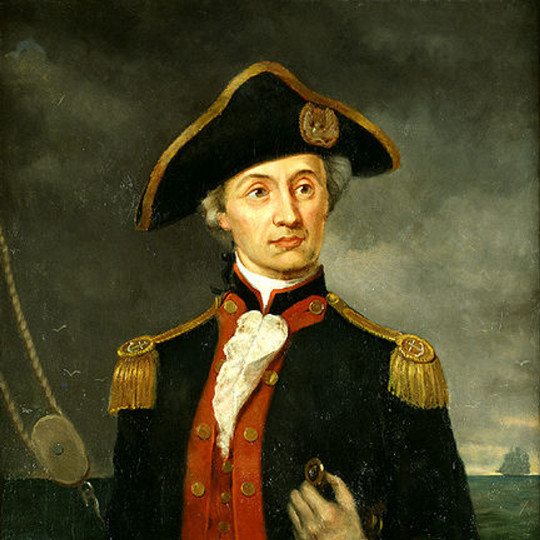
John Paul Jones
John Paul Jones (1747-1792) was a Scottish-born sailor who served in the Continental Navy during the American Revolutionary War (1775-1783). His raid on the English port town of Whitehaven in 1778 and his victory over the HMS Serapis the following year turned him into a war hero and led many to consider him the 'Father of the American Navy'.
Jones began his maritime career at the age of 13, serving aboard various merchant vessels and slave ships. After killing a mutinous sailor in the West Indies, he fled to the British colony of Virginia and joined the Continental Navy when the American Revolution broke out in 1775. He was given command of the USS Ranger, which he used to attack British commercial shipping in the Irish and North Seas. He raided Whitehaven, plotted to kidnap the Earl of Selkirk, and commanded the USS Bonhomme Richard in its grueling, 3-hour naval duel with HMS Serapis. These actions cemented Jones' reputation as one of the best naval commanders in US history. After the war, the Continental Navy was disbanded, leading Jones without prospects. He therefore entered the service of the Russian Empire in 1787 but left in disgrace two years later, after sexual assault allegations against him sparked an international scandal. He died in Paris on 18 July 1792 at the age of 45.
Early Life
On 6 July 1747, John Paul was born at the estate of Arbigland in the county of Kirkcudbrightshire, Scotland – he would not add 'Jones' to his name until he came to America. His father was the head gardener at Arbigland and had seven children, five of whom would survive to adulthood. Though John Paul attended the nearby Kirkbean School, his true education occurred at Carsethorn, the local port. He would spend much of his free time there, breathing in the briny sea air, marveling at the comings and goings of ships, and talking with sailors, learning everything he could about life at sea. Paul could not long resist the call of the sea and, at the age of 13, he obtained an apprenticeship with John Younger, a Scottish merchant and shipowner operating out of the English port town of Whitehaven.
It was not long before John Paul embarked on his first voyage, sailing out of Whitehaven aboard one of Younger's vessels, the Friendship, as a ship's boy. The voyage took Paul across the Americas, stopping first at Barbados before sailing up to the British colony of Virginia. Here, Paul briefly reunited with his older brother, Thomas, who had previously emigrated to Fredericksburg, Virginia. In 1764, upon returning to Whitehaven, Paul was released from his apprenticeship early, because Younger's business had gone bankrupt. He found work aboard a slave ship and spent the next three years transporting human cargo from Guinea to Jamaica. In 1766, the 19-year-old Paul became first mate of the slave ship Two Friends, a lucrative position. However, he gradually grew disillusioned with the slave trade and became disgusted at his own role in perpetuating it. In 1768, he abandoned the Two Friends while it was docked in Kingston, Jamaica, and booked passage on a ship bound for Scotland.
Not long into the voyage, both the ship's captain and first mate died of yellow fever. Since there was no one else on board who knew how to navigate a ship, Paul took charge and guided the vessel safely to Scotland. The ship's grateful owners rewarded Paul with ten percent of the vessel's cargo. Impressed with his nautical skills, they also offered him the captaincy of a merchant brig named John. Paul accepted and captained two voyages to the West Indies. It was during his second voyage, in 1770, that Paul had the ship's carpenter flogged with cat-o'-nine-tails as punishment for neglect of duty. The carpenter died at sea several weeks later. When the John returned to port, Paul was arrested and imprisoned at Kirkcudbright Tolbooth, charged by the dead man's father of having caused his death. Paul maintained that the carpenter's death had been unrelated to the flogging, that it had instead been caused by yellow fever. After producing several witnesses to substantiate this claim, Paul was acquitted, although the incident left a dark stain on his reputation.
In 1772, Paul once again sailed into the West Indies, this time captaining a merchant vessel called Betsy. Toward the end of the voyage, in 1773, the Betsy arrived at Tobago, where several sailors decided to stage a mutiny. Paul responded to the mutineers' demands by running the ringleader through with his sword, killing him. Although Paul would always claim that he had acted out of self-defense, he knew that the public opinion in Tobago would be against him, since the man he had killed had been a local. To evade a trial, he fled to mainland North America, where he added 'Jones' to his name to help conceal his identity. After the death of his brother William, he went to Fredericksburg, Virginia, to settle his affairs and decided to live there himself.
Continue reading...
30 notes
·
View notes
Text
What was almost more remarkable than Paul’s journeys was the breathtaking rise in infrastructure and transport that enabled him to make them: in other words, the roads, grain ships, seaways and highways of the Roman Empire. Read the accounts of Paul’s travels one way, and they are a chronicle of awesome faith; read them another, and they are a chronicle of the even more awesome efficiency of Roman transport networks.
Paul might be famous for those 10,000 miles but, as the historian Wayne Meeks has pointed out, that distance is puny in comparison to the distances that others travelled in this period: the gravestone of a merchant found in Phrygia, in modern Turkey, records that he had travelled seventy-two times to Rome – a trip that is perhaps 2,000 km in either direction.
This is not to say that travel was wholly safe: it wasn’t. People consulted interpreters of dreams about travel anxieties almost more than anything else, and not without cause: as the parable of the Good Samaritan clearly shows, being beaten up and left for dead while on the road was a well-known hazard. But, nonetheless, in this period travel was being revolutionized. Within the empire, Meeks writes, people ‘travelled more extensively and more easily than had anyone before them – or would again until the nineteenth century.’
[...]
Whether or not most Romans paused to think much about it, the scale of the trade that travelled through their empire by land and by sea was staggering. Archaeologists, who have used the number of shipwrecks found at the bottom of the Mediterranean as a guide to the number of ships that once sailed on its surface, suggest it was not until the nineteenth century that Mediterranean trade regained its Roman levels.
Greco-Roman traders gained such detailed knowledge of other lands that they could write authoritative guidebooks on the quality of the water in Indian ports and what sold well there (Italian wine was, apparently, considered a particularly exotic delicacy). International trade with the subcontinent grew so much that Roman writers fretted about the trade deficit that existed between it and Rome. ‘At the very lowest computation, India, the Seres, and the Arabian Peninsula, withdraw from our empire one hundred millions of sesterces every year,’ wrote Pliny, adding, primly, ‘so dearly do we pay for our luxury and our women.’
The number of coins in circulation increased in this period, as did the production of metal. Analysis of the ice caps of Greenland show that air pollution, caused by the smelting of such metals as lead, copper and silver, would not reach Roman levels again until the sixteenth or seventeenth century.
Another measure of the high levels of trade in this era is the amount of ancient packing material that remains – in other words, of Roman pots. Amphorae, which in Roman times were used to transport more or less everything, were produced on a colossal scale. To understand quite how colossal, travel to Rome, walk southwards down the Tiber from the Colosseum, and you will see a mound, patchily covered in grass. This fifty-metre-high hillock – which is known as Monte Testaccio – is made entirely from broken oil amphorae. Inside the mound lie the fragments of an estimated fifty-three million amphorae, in which an estimated six billion litres of oil were imported into Rome.
Not only did people travel far; they also travelled fast. The speed of Roman travel, particularly for the wealthiest, was astonishing. Early in its imperial history, Rome’s emperors had set up the Roman imperial post – probably in imitation of similar systems that had been read about – and envied – in ancient accounts about Persia. This was not a post system as modern minds might imagine it, to be used by everyone, but was for imperial messengers, and its infrastructure duly demonstrated imperial ambition and grandeur: every twenty-four miles or so was a rest station; at each station, forty of the finest, swiftest horses were stabled, along with a proportionate number of grooms. A courier could therefore arrive, switch horses and set off again, and travelling in this way might cover ‘a ten days’ journey in a single day’ – in other words, it is now thought, 160 miles.
As the historian Procopius explained, emperors had set such a system up so that if there was a war, mutiny or any other disaster anywhere in the empire, the news could reach Rome fast – and it seems to have worked. The evidence for this is unusually good, because, while such disasters may have been unpleasant for the emperor experiencing them, they have been splendidly useful to later historians, since imperial deaths and assassinations tend to appear in histories with careful time stamps. They can thus be used to calculate how fast ancient travel could, in extremis, be. And the answer is: very fast indeed. After the death of Nero, for example, a messenger travelled from Rome to Northern Spain (a distance overland of around 1,800 km) in a breathless seven days. Probably that messenger did the bulk of the journey over the sea. Nonetheless, it is very, very fast.
It wasn’t just people who were on the move, either. Head to a fancy Roman dinner party and the supper on your plate could easily be as international as the guests reclining at your side, for, as one satirist put it, the ‘bottomless gullet’ and ‘tireless gluttony’ of Rome was perpetually on ‘eager quest of dainties from all quarters’. A single gourmand might, for their dinner party, source ‘a peacock from Samos, a woodcock from Phrygia, cranes of Media, a kid from Ambracia, a young tunny from Chalcedon, a lamprey from Tartessus, codfish from Pessinus, oysters from Tarentum, cockles from Sicily, a swordfish from Rhodes, pike from Cilicia, nuts from Thasos, dates from Egypt, acorns from Spain...’
-- Catherine Nixey, Heresy
14 notes
·
View notes
Text

November 5th 1983 saw an "incident" at the North Sea oil rig Byford Dolphin the resulted in 5 men losing their lives.
I was debating whether this falls under my "Scottish" remit as such, but two of the divers were british, and the North Sea is by and large part of our territories, as well as Scandinavia, who also drill out there. The manner of their deaths is quite gruesome
The Byford Dolphin Decompression Incident was The worst diving accident In History, well until the Titan submersible implosion last year equalled the death toll.
On a normal day at work, two divers climbed into the rig’s diving bell, a transportation chamber to take them down to depth before heading down to the chamber system far below the surface. At first, all seemed to go well, with the divers taking turns resting and heading out to work on the rig.
During their time underwater, however, two divers were resting in their decompression chamber while another two divers made their way to the chambers in the diving bell. Everything was going as planned as the two tenders—the “drivers”—secured the bell to the chambers. The two divers on board would soon proceed to their own compression chamber. However, as the tenders were preparing to depart, they failed to seal off the diving bell properly from the chambers before beginning their ascent.
What ensued was that the chambers were suddenly decompressed from nine atmospheres to one atmosphere, and the air rushed out of the chambers. Tragically, three of the divers inside the chambers at the time were killed in a horrible way—through explosive decompression. Essentially, the nitrogen bubbles in their blood expanded, causing them to boil from the inside out. The fourth was sucked out of a very narrow opening, ejecting his internal organs, spraying the deck with gory torrent.One of the divers in the bell was also killed in the accident The only consolation is that their demise would have ben mercifully fast.
The North Sea Divers Alliance, formed by early North Sea divers and the relatives of those killed, continued to press for further investigation and,it wasn't until February 2008 that they obtained a report that indicated the cause was faulty equipment. The families of the divers eventually received compensation for the damages from the Norwegian government, 26 years after the incident.
The rig was the site of several serious incidents, and was only decommisioned in 2019, the pic shows the rig at Invergordon.
9 notes
·
View notes
Text

In the name of Allah. We have lived through the hardest, worst, and most dreadful two nights of our lives. We have lived through death in all its details. We are alive.

I can't believe that we are alive. I swear, I can't believe it.

The communications and internet are still weak.. People are reassuring each other internally. We don't know who has died and who has survived. We don't have news about one another.

I am in the Shati refugee camp in the areas located in the northern part of #Gaza.. Since 7:00 PM on Friday, the bombardment has not stopped for a single moment, be it from artillery, the sea, or the air. Saturday night, we experienced the most challenging bombardment, with over 200 airstrikes within half an hour. We were certain that we would not survive it. We woke up to the martyrdom of 45 people around us.

The bombardment is still ongoing up to this moment, in addition to the continuous gunfire from aircraft and warships. Three houses beside us have been targeted. There is a great difficulty in knowing the news of our neighbors and the people, as well as challenges in transporting the wounded and notifying the ambulance services due to the severed communications. Our concern was to be shelled and die without anyone knowing about us. #Gaza

Heavy bombardment is happening right now in the Shati refugee camp.
#gaza#palestine#gaza strip#free gaza#free palestine#storiesfromgaza#غزة#فلسطين#genocide#humanitarian crisis
46 notes
·
View notes
Text
Gaza, Palestine.
"Several people have reportedly been injured and at least 5 killed after parachutes dropping aid over #Gaza failed to open. Video shows the aid falling quickly to the ground, as people gathered to collect desperately needed food and supplies."
March 8, 2024
(Aljazeera English post with video link)
Articles for context:
"Airdropping aid is inefficient—so why is the U.S. doing it anyway?" (NPR)
Article Date: March 4, 2024.
Quote.
[...]
Konyndyk (president of Refugees International): Well, the first thing to understand about airdrops is they are probably the most inefficient possible way to deliver aid. So they're used very, very sparingly and only when there is truly no other way to get aid in. So we would use them if a population was completely physically inaccessible, if they had been cut off by an earthquake or a hurricane or if there was fighting or if they were besieged. So, for example, when Iraqi Yazidis were fleeing the genocidal militia, the ISIL militia that had pushed them out of their town, they fled up Sinjar Mountain. And in 2014, when I was at AID, we organized airdrops by the U.S. military onto Sinjar Mountain to sustain them. Outside of those kind of situations, it's very, very rare. I can't think of one where we've used them in a place that was simultaneously being served by overland access.
Shapiro (interviewer): Can you just explain why it is so inefficient, why it is such a sort of last resort?
Konyndyk: Well, first is cost. It is about - you know, and obviously, every situation is a little different, but ballpark 8 to 10 times as expensive logistically to deliver by air as by overland transport. And the volumes are much smaller. So to put this in perspective, Samantha Power, the administrator of USAID, was in the Middle East last week. And she gave remarks in the West Bank, where she was bemoaning the fact that only about 96 trucks per day, on average, had been getting into Gaza. Well, the three planeloads that the U.S. dropped last week are equivalent to ballpark four to six truckloads. So it really is not a significant additional amount of aid relative to the already hugely inadequate amount that's getting in.
Shapiro: That's staggering, that not only is it eight to 10 times more expensive, but it's the equivalent of four to six truckloads. And the number that President Biden himself has described as wholly insufficient is something like 96 trucks per day.
Konyndyk: Correct.
[...]
"Gaza Authorities Say Accident Involving Airdropped Aid Kills 5" (New York Times)
Article Date: March 8, 2024; Updated March 9, 2024.
Quote.
The authorities in Gaza said at least five Palestinians were killed and several others were wounded on Friday after packages of humanitarian aid that had been airdropped fell on them in Gaza City.
[...]
In the clip, whose date and location were verified by The New York Times, it appears that one parachute failed to open, while multiple packages that were not attached to parachutes plummeted to the ground. In the clip, filmed near Al-Shati Camp, people can be seen running in different directions.
The government media office said in a statement that the packages fell “on the heads” of some people “as a result of landing incorrectly.” The office added that it had previously warned that a similar incident could occur during airdrops and “pose a death threat to the lives” of civilians in Gaza. Noting that some of the aid had landed in the sea or close to the Israeli border, the statement said that airdrop operations were “ineffective and not the best way to deliver aid.”
[...]
U.N. officials, aid groups and experts on humanitarian crises have said the airdrops are insufficient and largely symbolic, given the dire needs of the two million Gazans still trapped in a war zone. They have urged Israel to open up more border crossings and to speed up inspections of the aid shipments.
Airdrops can only deliver a fraction of the food a convoy of trucks can haul, and it is difficult if not impossible to control who takes possession of the goods once they reach the ground, these experts have said.
But dangers posed by failed parachutes and falling pallets of food, water and other aid are also a major risk in airdrop operations.
[...]
30 notes
·
View notes